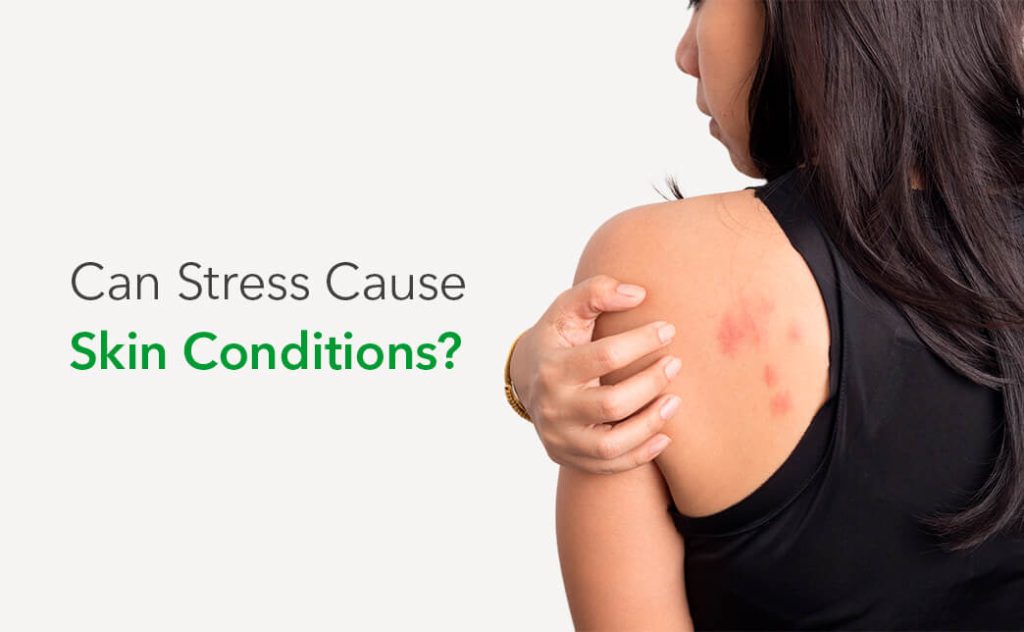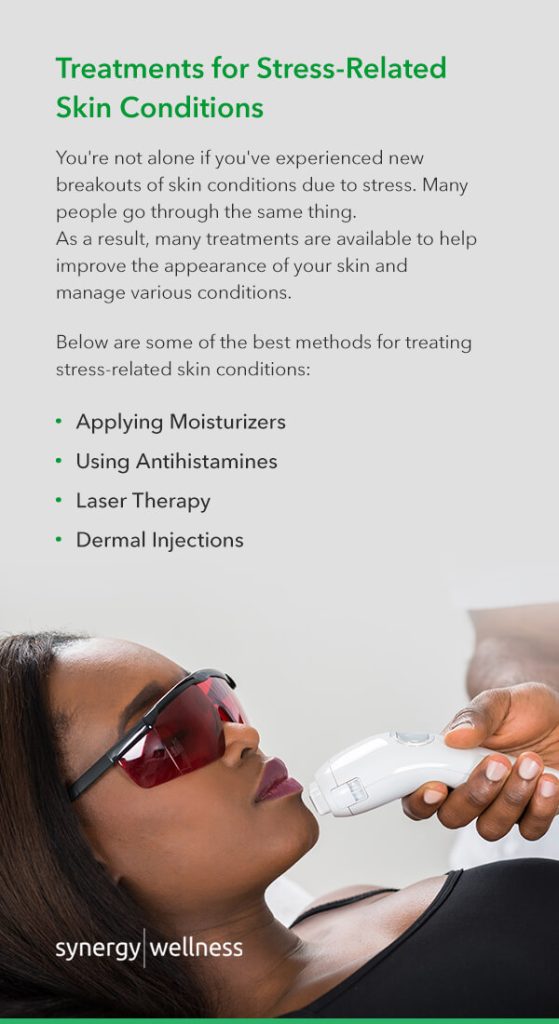
We might experience stress for many reasons, whether related to work, school, relationships, finances or general anxiety. Many people are aware of stress’s effect on the body — especially on the heart — but might not know how stress can affect the skin. When you’re stressed, you might experience more breakouts or worsened certain skin conditions.
If you’re stressed all the time, you might find it challenging to manage your breakouts or skin problems. Continue reading to learn more about skin conditions caused by stress and anxiety and how you can treat these conditions.
How Can Stress Cause Skin Conditions?
Stress is a normal part of life, and we all experience it from time to time. However, long-term stress can have drastic effects on our skin’s health. Our central nervous systems have become more sensitive after being subjected to overstimulation, meaning our body reacts to stress with more significant consequences. The body goes into “fight or flight” mode when you’re stressed and releases stress hormones, such as cortisol and adrenaline.
Our body naturally produces cortisol, which usually reaches its peak in the morning but is also released any time we feel stressed. If you’re constantly stressed or overwhelmed, this hormone is released consistently, disrupting its normal cycle. This disruption can lead to breakouts and worsen certain conditions, such as eczema or rosacea.
Cortisol and adrenaline also help your body react to a perceived threat by increasing your heart rate and tightening your muscles. The body focuses on providing energy and resources to vital organs, meaning other functions — such as digestion or reproduction — get shut down.
The skin is considered to be a non-vital organ. When we’re stressed, the body will move vitamins and minerals to essential organs to prepare for a perceived threat. Stress hormones also suppress our immune system response to conserve energy, making you more susceptible to infections. A suppressed immune system can disrupt menstrual cycles in women, causing hormone fluctuations. Collagen and elasticin production are also impacted.
With all of these factors, it’s no surprise that stress can cause breakouts or exacerbate skin conditions. The more stressed you are, the more likely you’ll experience breakouts, dryness, stress rashes and other skin conditions.
Skin Problems That Can Be Caused by Stress
Long-term stress can cause multiple skin conditions to develop or worsen existing symptoms. Stress can contribute to the appearance of weaker, inflamed skin, which can cause various skin conditions. Skin problems caused by stress include:
Dryness
Stress can weaken the skin’s natural moisture barrier, protecting the skin from pollutants, such as dirt, grime and dust. Without the moisture barrier, the skin can become dehydrated, leading to dryness or cracking. Stress can cause dry skin or make existing dry skin conditions worse. Dry skin can sometimes feel painful to the touch, and it can also cause acne breakouts. If you’re stressed, ensure you’re drinking plenty of water to help your skin maintain its natural moisture barrier.
Acne
Many people get acne breakouts from excess oil, which clogs the pores and creates pimples. When you’re stressed, your body will produce even more oil, causing further breakouts. You might notice that you break out more during a stressful week at work or when you have a lot on your plate. If you make time during your busy schedule to maintain your skin care routine, you should be able to manage these breakouts when they happen.

Eczema or Dermatitis
When you’re stressed, your body produces cortisol, which can cause your skin to become even oily than usual. If you have eczema or dermatitis, this excess oil can cause a flare-up, which can cause even more stress, creating a vicious cycle. Excess stress can cause dermatitis to develop even if you’ve never experienced it before. Since stress suppresses the immune system, it will take longer for the flare-up to heal.
Rashes
Stress can cause rashes anywhere on the body, even the face. With a weakened immune system, your skin can dry out. It can also cause your hormones to become unbalanced, causing redness or a rash. If you have skin conditions — such as dermatitis — you might experience more rashes or inflamed skin when you’re stressed.
Wrinkles
Long-term stress can impact collagen and elastin production, meaning it can reduce the skin’s elasticity. Without elasticity, wrinkles can form and speed up the signs of aging. If you experience stress-related wrinkles, you can seek treatment to improve your appearance.
Rosacea
Rosacea is a condition where the face or skin flushes and sometimes looks like an acne breakout. When the skin becomes flushed, it can cause red or brown spots to appear on the face, particularly the cheeks. While there are many physical triggers for rosacea, including spicy foods, stress is an emotional trigger that can cause the condition to flare up. Flare-ups can cause additional stress, making further breakouts more likely.

Baggy Eyes
In the same way we might get dark circles under our eyes from inadequate sleep, stress can cause the appearance of baggy eyes. Baggy eyes occur when the skin under your eyelids becomes swollen or puffy. People often experience baggy eyes as they age and their skin loses its natural elasticity. Stress can speed this process up by decreasing elastin production, making you develop eye bags sooner.
Psoriasis
Psoriasis is a condition that causes scales or dry patches on the skin. Researchers believe a problem within the immune system causes it. Stress can further compromise the immune system, causing psoriasis flare-ups that make the same symptoms more uncomfortable and challenging to manage. If you have psoriasis, it’s essential to manage your stress so you experience fewer flare-ups and improve your symptoms.
There’s a direct correlation between stress, anxiety and skin problems. Many of these conditions appear after long-term stress, but extreme stress in short-term situations can bring about many uncomfortable symptoms, such as rashes, acne or dryness. Staying on top of your stress and using healthy coping skills can help reduce the risk of stress-related skin conditions.

Treatments for Stress-Related Skin Conditions
You’re not alone if you’ve experienced new breakouts of skin conditions due to stress. Many people go through the same thing. As a result, many treatments are available to help improve the appearance of your skin and manage various conditions. Below are some of the best methods for treating stress-related skin conditions:
1. Applying Moisturizers
Your skin might be dryer than usual due to stress, which can cause breakouts or worsen symptoms of eczema or rosacea. You can rehydrate your skin by applying moisturizers made for dry skin types. However, you’ll want to use a moisturizer as the last step of your skin care routine.
You should use a gentle cleanser or exfoliator to help eliminate grime from your pores before applying a moisturizer. If you don’t prepare your skin each time, a moisturizer could clog your pores after repetitive use and cause further breakouts and inflammation.
If your skin is frequently dehydrated, you can complete your skin care routine once in the morning and once at night. If you live in an area with low humidity, you may need to moisturize more. If you’re not sure how to properly take care of your skin, you can talk with a professional to help you determine how to combat stress-related skin issues.
2. Using Antihistamines
If you have a stress-related skin rash or inflammation, you can use antihistamines to reduce the discomfort and uncomfortable symptoms. The breakout should only last for a couple of days, and you can buy over-the-counter medication to help alleviate itching and reduce swelling or inflammation.
However, if you have a more severe reaction, you could talk with your doctor about prescription-strength antihistamines or steroids. You can choose a topical or oral treatment whether you get the medication from the store or a doctor. Topical treatments often aren’t enough to treat severe rashes, so you may need to select an oral medication. If you’re not sure about the severity of your rash, it’s always best to consult with your primary physician or a dermatologist.
3. Laser Therapy
Stress can damage the skin and make you look more aged than you are. Laser therapy can help treat many stress-related skin conditions, including fine lines, wrinkles and pigment changes due to rosacea.
A professional will use gentle laser treatment to target specific areas of the skin, leaving undamaged cells untouched so they can help heal the skin. Laser therapy will gently remove the old layer of skin on the top of the epidermis. Simultaneously, the laser will heat the next layer of skin, promoting collagen production. Collagen helps improve the texture and tone of your skin, leaving you with a radiant and youthful appearance.
4. Dermal Injections
Stress can cause wrinkles or fine lines, creating an aged appearance. If you want to try something besides laser therapy, you can use dermal injections. A professional will inject a dermal filler under the skin to help smooth wrinkles and soften lines. Many dermal injections also promote collagen production, which will help keep your skin looking healthy and youthful long after treatment.
Other Ways Stress Affects the Body’s Appearance
While stress can do a number on the skin, it also has consequences in other areas of the body. Excess anxiety can throw your hormones off balance and make your immune system less effective. As a result, other parts of your appearance may start to show signs of stress, including:
- Teeth: When you’re stressed, you might grind your teeth without even realizing it. If you grind your teeth each time you’re stressed, your teeth can become weak, damaged, chipped or broken. Extensive tooth damage will require a trip to the dentist. When you’re stressed, take note of how your body reacts and reduce tension so you don’t cause unnecessary damage to your teeth.
- Hair: If you’re dealing with long-term stress, you might notice it affecting your hair. Stress can cause your hair to begin to fall out or turn gray. That’s why you might notice politicians or public figures going gray or bald before their 50s.
- Nails: Our bodies aren’t as productive at absorbing nutrients when we’re stressed, so your nails might become weak if you’ve recently experienced a lot of stress. You may also bite at your nails as a nervous tick, damaging the nail or cuticle and harming their appearance.
- Lips: Some people’s reaction to stress is to chew on their lips or the inside of their mouth. While this can cause a sore lip, it can also cause a dry or cracked appearance.
- Weight: Some people stress-eat to help them feel better in the moment, leading to excess consumption of sugary foods. An unhealthy diet can cause weight gain, which can cause more stress. Without proper stress management techniques, it can become a vicious cycle that can be challenging to stop.
Other Tips for Managing Stress
One of the best ways to reduce the effects of stress on your appearance is to learn the proper coping skills to manage it. Stress is bound to happen. Learning how to manage your stress can help keep you in good health and maintain your appearance. Try these tips next time you feel overwhelmed with anxiety:
- Make time for relaxing activities: If you’ve got a busy schedule, making time for activities you enjoy can help you reduce stress. If you like to hike and find it brings you peace, plan to take an afternoon traversing your favorite trail after work or on a day off. Taking a relaxing bath can also help you feel better at the end of a stressful day.
- Form healthy lifestyle habits: If you’re feeling stressed, a healthy diet and plenty of sleep can help your body recover from a stressful event.
- Exercise regularly: Exercise increases dopamine and reduces stress hormones. When you exercise regularly, you’re releasing tension and improving your physical health, giving your body the tools to manage stress.
- Spend time with loved ones: Friends or family members can be there for you when you’re feeling stressed and help you find solutions.
- Talk with a professional: If you find it challenging to deal with stress, you can talk with a professional to learn how to cope with stress. They can provide you with the tools you need to reduce the stress in your life and improve your well-being.
- Avoid relying on substances: Using alcohol or drugs to cope with stress can lead to abuse and addiction. Substance abuse can also cause additional skin problems, which you’re trying to prevent in the first place.

Medical Aesthetic Treatments for the Skin in Bakersfield, CA
If you’ve experienced chronic stress and skin problems, Synergy Wellness is here to help with our medical aesthetic treatments for the skin. Our cosmetic services are specially designed to help you improve your skin and create a youthful appearance. We work with you through the entire process to ensure we can help you achieve your desired results.
Our procedures are minimally invasive, whether you choose laser therapy or skin resurfacing. Our professional staff has the knowledge and skills to help your vision come to life. At Synergy Wellness, we can help you transform your skin to achieve your beauty goals. Contact us today to learn more about our services and how we can help you look your best.



